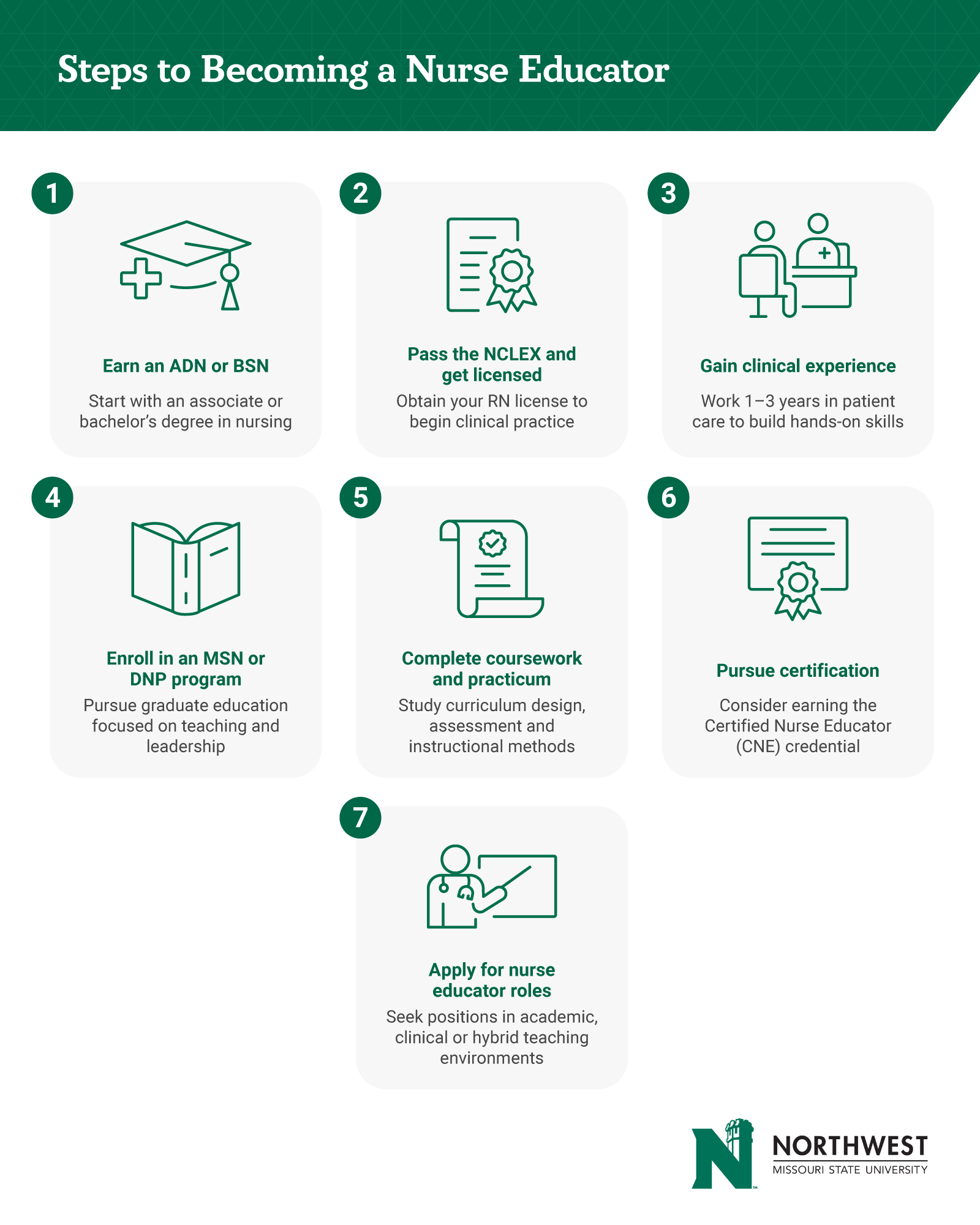
For nurses looking to advance their careers beyond bedside care, becoming a nurse educator is a meaningful way to shape the future of healthcare. A nurse educator is a licensed RN who teaches, mentors, and develops nursing talent in clinical and academic settings. They help prepare the next generation of professionals to meet the demands of the nursing profession. One path forward is Northwest Missouri State University’s online Master of Science in Nursing (MSN) – Nurse Educator program, which is designed to support nurses in making this transition.
There is a growing demand for qualified nurse educators. It stems from faculty shortages, an aging workforce, rising nursing school enrollments and the continuous evolution of patient care. This guide outlines how to become a nurse educator, including degree options, licensure steps, certification pathways, job settings, salary potential and how to transition from clinical practice into a teaching role. Use it as a guide to help you align your education, credentials and experience with the right career path in healthcare education.
What Is a Nurse Educator?
A nurse educator is a registered nurse who teaches in an academic and clinical environment. Their core responsibilities often include curriculum development, classroom and clinical instruction, student assessment, mentoring, and evaluating nursing competencies.
In academic settings, educators tend to be faculty members. They may teach in classrooms or simulation labs, participate in scholarly research and help shape nursing education programs. For example, a faculty member at a community college might write lesson plans for a pharmacology course and oversee simulations in a lab setting.
In clinical settings, nurse educators support staff development. They often lead onboarding, provide in-service education, and contribute to policy or quality initiatives. For example, a hospital-based educator might coach new nurses on proper wound care protocols during their first month on the job.
Nurse educators play a dual role in academia and practice. They bridge the two through mentorship, hands-on guidance, and a commitment to patient care and professional standards.

Where Do Nurse Educators Work?
Nurse educators work in a wide range of academic and clinical settings. These might include:
- Universities and four-year colleges
- Community colleges and nursing schools
- Hospitals and health systems
- Public health departments
- Long-term care facilities
- Private training centers
- Simulation and skills labs
As for employment models, they can vary. Some educators hold full-time faculty positions, while others teach part-time or serve as adjuncts. Clinical roles might involve working as unit-based or float educators or in per-diem positions on a flexible schedule.
Work hours also depend on the setting. Some schedules will follow the academic semesters. Others accommodate evening, weekend or rotating clinical schedules. Many institutions now offer hybrid or fully remote roles, particularly in online nursing faculty positions.
Why Become a Nurse Educator?
Nurse educators help shape the future of nursing through mentorship and real-world training. For many nurses, the career path of advanced nursing is one of purpose-driven work and long-term opportunities for growth. These are some of the top reasons professionals pursue a role of nurse educator:
- Improved care quality and workforce readiness: Educators support better patient outcomes by equipping future nurses with essential clinical and critical-thinking skills.
- Career advancement into leadership roles: Academic clinical nurse educators might move into curriculum oversight, policy development or higher education administration.
- Opportunities for professional development: Many nurse educators contribute to nursing scholarship and research, which expands their impact on the field.
- Flexible work schedules: Teaching roles may offer predictable hours, summers off or hybrid/online options.
- Competitive salary: According to the S. Bureau of Labor Statistics (BLS), nurse educators earn a mean annual salary of $86,530.
- Mentorship and mission-driven work: Nurse educators help shape the next generation of nurses, creating a ripple effect across the nursing field.
How Long Does It Take to Become a Nurse Educator?
The path to becoming a nurse educator typically starts with earning a Bachelor of Science in Nursing (BSN) and gaining relevant nursing experience before pursuing a MSN or a PhD, such as a Doctor of Nursing Practice (DNP). The overall length of time depends on a nurse’s prior education, work experience and pace.
Step‑by‑Step Guide: How to Become a Nurse Educator

Becoming a nurse educator involves a combination of academic preparation, clinical experience and certification. This is a step-by-step guide to the process:
- Earn an ADN or BSN: Start by completing an Associate Degree in Nursing or a Bachelor of Science in Nursing.
- Pass the NCLEX and obtain an RN license: Licensure is required to practice and gain experience.
- Gain clinical experience: Work for one to three years in patient care to build real-world nursing skills.
- Pursue advanced education and training: Enroll in a graduate program (such as an MSN or DNP) that includes specialized coursework, practicum hours, and preparation in education and leadership.
- Pursue certification: Consider becoming a Certified Nurse Educator (CNE) or earning other credentials that align with your goals.
- Apply for nurse educator positions: Look for openings in academic, clinical or hybrid roles that match your background.
Required Education: From RN to Advanced Degrees
Nurse educators follow an academic path that builds on foundational nursing skills. While entry-level roles may require only a bachelor’s degree, teaching positions in academic settings typically need a master’s in nursing or a doctoral degree, such as a Doctor of Nursing Practice or Doctor of Philosophy (Ph.D.) in nursing. Choosing a concentration in nursing education can also help tailor coursework to long-term teaching goals.
| Degree Ladder for Future Nurse Educators | |
| Degree | Typical Purpose |
| Associate Degree in Nursing (ADN) | Entry into nursing practice; not sufficient for most educator roles |
| Bachelor of Science in Nursing (BSN) | Required for RN licensure and foundational clinical experience |
| Master of Science in Nursing (MSN) | Common requirement for nurse educator roles in academic and clinical settings |
| Doctor of Nursing Practice (DNP) or Ph.D. | Often preferred for tenure-track, leadership or curriculum development positions |
Transitioning from Clinical Nurse to Educator
Experienced nurses bring valuable knowledge to the classroom and training floor. If you are considering a nurse educator position, there are five practical tips to guide your move:
- Start mentoring early: Serve as a preceptor or training lead to build confidence and experience guiding new nurses.
- Pursue formal education: Enroll in an MSN or PhD with a focus on nursing education to meet academic hiring requirements.
- Join committees or development projects: Contributing to staff training, policy updates or continuing education efforts shows initiative and leadership.
- Build a professional network: Attend nursing education conferences, join associations, and connect with faculty members who can offer guidance or referrals.
Transferable skills from the clinical setting, such as patient teaching and team collaboration, lead to success in educator roles. Many registered nurses begin by mentoring peers or new hires before applying for full-time faculty roles.

Is Becoming a Nurse Educator Right for You?
Becoming a nurse educator is a rewarding career path that allows experienced nurses to improve patient care by preparing the next generation of nursing students. From earning a degree to applying for faculty positions, each step builds on your nursing career and broadens your impact on the future of nursing.
Planning your transition involves researching programs with accreditation, speaking with mentors, and mapping a timeline that works with your personal and professional goals. For nurses ready to make this transition, the MSN – Nurse Educator online degree from Northwest offers a flexible, accredited pathway that combines curriculum development, instructional strategies and advanced nursing knowledge.
This versatile degree allows you to pursue your desired career outcomes while maintaining your current work schedule, making it an ideal choice for working professionals seeking to advance their careers in nursing education. Continuous learning through certification and continuing education will also support long-term success.
Before applying, review each program’s curriculum, cohort structure and practicum requirements. Contact the student engagement team with questions about scheduling, clinical placements and support services.
Learn more about Northwest’s online Master of Science in Nursing – Nurse Educator program.